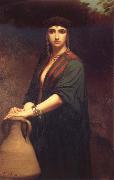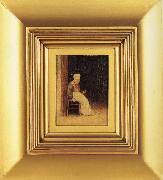
|
Charles Landelle
|
|||
|
|
|||
| 1812-1908 French painter. His father, a calligrapher and musician from Mayenne, moved to Paris in 1825 to take up a post as musician in the Tuileries. Ary Scheffer, whom Landelle met through his father's contact with the Orleans court, encouraged him to become a painter. He registered at the Ecole des Beaux-Arts on 2 October 1837 as a pupil of Paul Delaroche and made his debut at the Salon in 1841 with a Self-portrait (Laval, Mus. Vieux-Cheteau). His first success, Fra Angelico asking God for Inspiration , indicated a sentimental, religious tendency in his work, which alternated with pretty pictures of young girls. Charity. commissioned by Antoine Vivenel (1799-1862), was followed by Idyll and Elegy (untraced), which were bought by the dealer Adolphe Goupil on the opening day of the 1844 Salon. The contract to buy also included Goupil's right of first refusal on the reproduction of all Landelle's future work. Subsequently, he painted the Three Marys at the Tomb in the pious manner of Ary Scheffer and a sweet, angelic St Cecilia, commissioned in 1845 by the Prefect of the Seine, in which elements of the early Renaissance art seen by Landelle on a trip to Italy in 1845 combined with the soft, pale style common among some of his colleagues from the studio of Delaroche. He also painted religious works for St Roch (1850), St Germain l'Auxerrois (1856) and St Sulpice (1875) churches in Paris. | |||
|
|
|||
|
Peasant Woman new12/Charles Landelle-559787.jpg Painting ID:: 39979 |
mk155 1866 Oil on canvas 131.5x84cm | ||
|
|
|||
|
Mortimer Menpes
|
|||
|
|
|||
| British Painter, 1855-1939 was a war artist and engraver, author, printmaker and illustrator. Menpes was born at Port Adelaide on 22 February 1855, the second son of property developer James Menpes, who with his wife, Ann, had settled in Australia in 1839. Educated at a private school, he attended classes at the Adelaide school of design, but his formal art training began at the South Kensington School of Art in 1878, after his family had moved back to England in 1875. Edward Poynter was a fellow student at the school. Menpes first exhibited at a Royal Academy exhibition in 1880. Over the following 20 years 35 of his paintings and etchings appeared at the Academy. He set off on a sketching tour of Brittany in 1880 and thereby met James McNeill Whistler, becoming his pupil and at one stage sharing a flat with him at Cheyne Walk on the Embankment in London. Here he was taught etching by Whistler, whose influence, together with that of Japanese design, is evident in his later work. His 1887 trip to Japan led to his first one-man exhibition at Dowdeswell's Gallery (1878-1912) in London. Menpes bought a property at 25 Cadogan Gardens in Sloane Square in 1888 and decorated it in the Japanese style. Whistler and Menpes quarreled in 1888 over the interior design of the house, which Whistler felt was a brazen copying of his own ideas. The house was sold in 1900, and Menpes retired to Kent. In 1900, after the outbreak of the Boer War, Menpes was sent to South Africa as a war artist for the weekly Black and White. With the war's end in 1902 he travelled widely, visiting Burma, Egypt, France, India, Italy, Japan, Kashmir, Mexico, Morocco, and Spain and producing illustrated books of those countries. His book on the Delhi Darbar of illustrated Curzon's grand spectacle of 1903. He married Rosa Mary Grosse in London in 1875. She too, was from Australia and died 23 August 1936. They produced a son, Mortimer James (b. 1879) and two daughters, Rose Maud Goodwin and Dorothy Whistler. Dorothy, Whistler's godchild, married a Mr. Flower and died in Minehead in July 1973 aged 89. | |||
|
|
|||
|
Peasant woman new16/Mortimer Menpes-669262.jpg Painting ID:: 42184 |
mk167 c.1890 Oil | ||
|
|
|||
|
Kazimir Malevich
|
|||
|
|
|||
| 1878-1935 Russian painter, printmaker, decorative artist and writer of Ukranian birth. One of the pioneers of abstract art, Malevich was a central figure in a succession of avant-garde movements during the period of the Russian revolutions of 1905 and 1917 and immediately after. The style of severe geometric abstraction with which he is most closely associated, SUPREMATISM, was a leading force in the development of CONSTRUCTIVISM, the repercussions of which continued to be felt throughout the 20th century. His work was suppressed in Soviet Russia in the 1930s and remained little known during the following two decades. The reassessment of his reputation in the West from the mid-1950s was matched by the renewed influence of his work on the paintings of Ad Reinhardt and on developments | |||
|
|
|||
|
peasant woman new23/Kazimir Malevich-538578.jpg Painting ID:: 68764 |
1930 oil on canvas 98.5x80 se | ||
|
|
|||
|
Also Buy::. For Following Paintings / Artists / Products, Please Use Our Search Online: |










